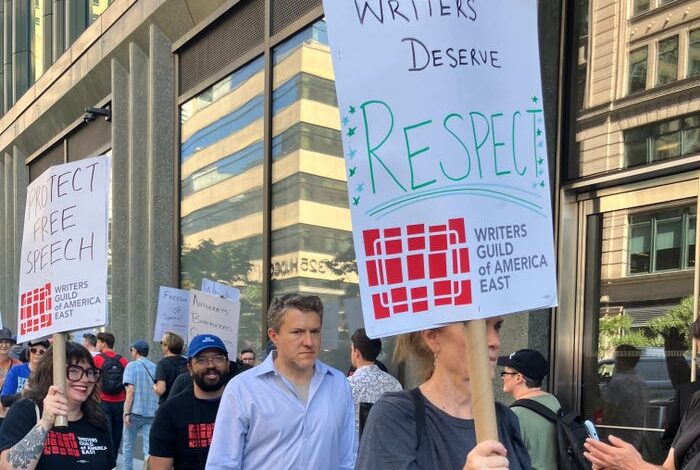Late-Night TV in Turmoil: Kimmel’s Suspension Sparks Outcry

UPDATE: The late-night television landscape is facing a crisis as Jimmy Kimmel’s suspension sends shockwaves through the industry. Just announced, Kimmel becomes the second host removed from airwaves following pressure from Donald Trump, raising fears that Seth Meyers and Jimmy Fallon could be next.
Rallies erupted outside Disney’s ABC offices in New York and Los Angeles, with members of the Writers Guild of America (WGA) demanding Kimmel’s reinstatement. Around 200 supporters gathered in LA, showcasing their anger towards both Trump and Disney. “It started with Colbert, but the Kimmel news crossed a line for everybody,” said WGA West President Meredith Stiehm.
The sentiment among industry insiders is alarmingly high. “There’s a sense of alarm,” a former staffer for Fallon expressed. “Among my friends, there’s a really practical feeling of, there’s no jobs left, and people are freaking out about that.” This suspension not only threatens Kimmel’s career but also puts the future of late-night programming on shaky ground.
Kimmel’s removal follows the cancellation of Stephen Colbert, who CBS claimed was axed due to “purely financial” reasons, reportedly losing about $40 million annually. Now, Trump is urging NBCUniversal to take similar action against Fallon and Meyers. Comedy writer Adam Conover stressed, “The message to those NBC shows is, if you don’t fall in line, we’re going to do the same thing to you.”
Both Fallon and Meyers addressed the situation during their Thursday night broadcasts, standing in solidarity with Kimmel. Meyers emphasized the importance of free speech, while Fallon used humor to critique Trump’s recent UK visit, although his jokes were partially obscured by a mock censor.
The current climate is precarious. The late-night TV economy was already fragile before Trump’s interventions, with audiences shifting towards streaming and on-demand content. “Late night won’t have a future,” warned Brandon Burkhart, a former writer for Fallon. “It’s going to be a major contraction in the next few years until streaming figures out how to do late night.”
As writers and performers rally for Kimmel, the stakes are higher than ever. Attendees at the protests voiced fears of an authoritarian shift in media. One participant, former “Tonight Show” writer Natasha Vaynblat, reflected on her parents’ immigration from Russia, stating, “I’m worried we’re turning into an authoritarian regime.”
The ongoing situation highlights the detrimental effects of media consolidation, as fewer companies wield increasing control over content and political discourse. Conover noted, “It shows why media mergers are so bad — when you have all these companies under one roof, the more they depend on political largesse.”
As the late-night community unites in this turbulent time, the focus remains on Kimmel and the broader implications for free expression in media. With industry veterans expressing their fears and standing together, the future of late-night television hangs in the balance.
Stay tuned for developments as this story unfolds and the fight for Kimmel’s return continues.






